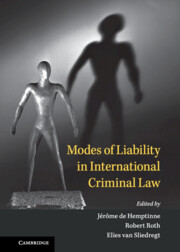Book contents
- Modes of Liability in International Criminal Law
- Modes of Liability in International Criminal Law
- Copyright page
- Contents
- Biographies
- Acknowledgements
- Abbreviations
- 1 Cross-Cutting Issues
- Part I Individual Commission
- Part II Joint Commission
- Part III Participation
- Part IV Participating in Group Activities
- Part V Inchoate and Preparatory Acts
- 11 Attempt
- 12 Planning
- 13 Conspiracy
- 14 Incitement
- Part VI Other Forms of Responsibility
- Part VII Concluding Observations
- Index
- References
12 - Planning
from Part V - Inchoate and Preparatory Acts
Published online by Cambridge University Press: 01 July 2019
- Modes of Liability in International Criminal Law
- Modes of Liability in International Criminal Law
- Copyright page
- Contents
- Biographies
- Acknowledgements
- Abbreviations
- 1 Cross-Cutting Issues
- Part I Individual Commission
- Part II Joint Commission
- Part III Participation
- Part IV Participating in Group Activities
- Part V Inchoate and Preparatory Acts
- 11 Attempt
- 12 Planning
- 13 Conspiracy
- 14 Incitement
- Part VI Other Forms of Responsibility
- Part VII Concluding Observations
- Index
- References
Summary
Planning is an essential mode of liability in ICL given the large-scale and inherently collective nature of international crimes. Indeed, as pointed out by the ILC, such crimes ‘by their very nature often require the formulation of a plan or a systematic policy by senior government officials and military commanders’. Moreover, preventing their perpetration requires that they be sanctioned at a very early stage, namely as soon as the plans are made. However, the penal sanctioning of a mere plan to commit international crimes might be said to unjustifiably extend the application of criminal law and have a negative impact on due process guarantees. In this context, it is striking to observe that international courts and tribunals have extensively relied on responsibility for planning over the last two decades without generating the level of controversy and/or mistrust that is often observed in relation to the closely related notion of conspiracy.
- Type
- Chapter
- Information
- Modes of Liability in International Criminal Law , pp. 355 - 366Publisher: Cambridge University PressPrint publication year: 2019



